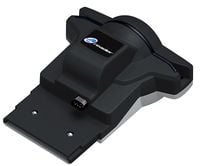e-Reader
The e-Reader is an add-on device for the Game Boy Advance released in 2002 that can read dot codes on special cards and interpret them into data. Depending on the card, the data may contain either information or some type of Minigame. Several complete Nintendo Entertainment System games were also made available on special packs of cards. It took a total of nine or ten dot codes (two per card) to store the data of an NES game.
Four series of e-Reader cards were released for use with Animal Crossing. Some cards featured Mario-themed designs that could be uploaded into the game. One card even rewarded the player with a copy of Mario Bros. to place in their home.
The e-Reader was packaged with a classic NES game (either Donkey Kong Jr. or Pinball) and a "sampler pack" containing an Animal Crossing card, three Pokemon cards (Machop, Machoke, and Machamp) that allowed a minigame to be played, and a Game & Watch card that contained Manhole. Australian copies also included an Air Hockey game.
In 2003, Nintendo released Mario Party-e, a portable board game which included numerous e-Reader cards, some of which contained Mini-games. However, the e-Reader wasn't mandatory in order to play the main game.
Later that year, Super Mario Advance 4: Super Mario Bros. 3 was released. By linking a Game Boy Advance with the game to a second Game Boy Advance with an e-Reader, a player could use three special types of cards.
- Power-Up Cards: A player could scan in items to add to their inventory. There was no limit to this option. There were also special switches that triggered new options in the game.
- Demo Cards: Upon scanning a Demo Card, the player was treated to recording of how to either uncover a secret in a level, or see a single-level speedrun.
- Level Cards: Probably the most desired, scanning these would add brand new levels into the game.
- For a complete listing, see Super Mario Advance 4 e-Cards.
After 2003, Nintendo discontinued the e-Reader outside of Japan due to low sales. As a result, many cards (particularly the new SMA4 levels, a planned series of Game & Watch releases, and a set of bonus levels for Mario vs. Donkey Kong) were never seen elsewhere. Additionally, the Nintendo DS, while compatible with Game Boy Advance games, was not designed to work with the e-Reader. It works on a Nintendo DS or DS Lite if the player were to open up the e-Reader and remove the Game Boy Advance Link Cable extension wires. The device was never released in Europe, and e-Reader functionality was absent in the European versions of the respective games.
